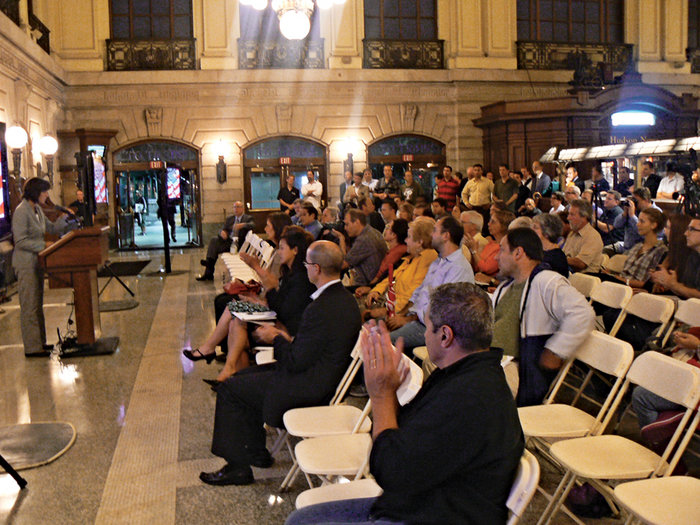The city and its planners are currently putting the finishing touches on their version of the New Jersey Transit Redevelopment plan, a major step in a 5-year process intended to utilize a 52-acre lot in the Southwest portion of the city near the Hoboken Terminal and rail yards. The plan is being prepared by Wallace Roberts & Todd, LLC, (WRT).
Mayor Dawn Zimmer said the plan will likely be presented to the City Council and the public within the next month.
NJ Transit is currently preparing its own plan, however, to make use of the 52-acre area. In 2008, NJ Transit presented a redevelopment proposal that included a 70-story office tower and several 45-story residential buildings. It was met with widespread community opposition, and eventually was scaled back.
“I am asking that NJT waive its request for confidentiality.” – Mayor Dawn Zimmer
____________
“It’s important that we protect the city from overdevelopment,” said Zimmer. “It all costs money, but to me it’s worth the investment, because you’re talking about the future of Hoboken.”
Zimmer wrote in a memo to the council last week that the city has moved forward with its own planner because New Jersey Transit was “unwilling to compromise.”
“Unfortunately, after extended negotiations requiring significant expenditure of legal fees, no agreement was reached,” said Mayor Dawn Zimmer in a memo to the council last week. “NJT was unwilling to compromise on what it believes is its legal authority to preempt local land use and Redevelopment law to build non-transportation related projects.”
The city and WRT have been gathering input from various focus groups, including the Artists Focus Group, the Quality of Life Coalition Committee for a Green Hoboken, the Hoboken Terminal and Rail Yards Task Force, and more. They have also held community meetings to allow members of the public to view project plans. Zimmer said that New Jersey Transit representatives have been in attendance at the meetings.
Multiple requests for comment from New Jersey Transit officials on the status of their plans were not returned by press time. Zimmer had said in last week’s memo that NJT’s plan has been shown to city officials on a “confidential basis.”
“I believe that the City Council and the public have a right to see and evaluate NJT’s proposed plan,” said Zimmer in the memo,” so it can be compared to the plan being developed by the city. I am therefore asking that NJT waive its request for confidentiality.”
Zimmer also said in the memo that the city recognizes that NJT’s input must be “seriously considered” in the crafting of the redevelopment plan.
Timeline
A 2006 study conducted by NJT and city officials indicated that the 52-acre area was an “underutilized resource.” The city council, in 2007, designated the area as “in need of redevelopment.”
NJT’s 2008 plan for a 70-store tower was met with widespread contention, despite Transit officials’ claim – and in some cases, because –the plan would bring 20,000 jobs and 6,000 new residents to Hoboken.
In September 2010, officials from NJT presented a new plan for 1.8 acres of the 52-acre site, called “Phase I.” The plan included a scaled back approximate 18-story office building, a redesigned bus terminal, and open space. Focus groups and community meetings were held to discuss Phase I of the plan.
Before NJT could present a plan for Phase II – which includes roughly 50 of the 52 acre space – the city of Hoboken and NJT failed to come to terms on who would have jurisdiction over the development, which prompted the city to hire their own planner.
Zimmer claimed that the NJT does not have authority over the property due to the development plans being unrelated to transportation.
“Our position is that that while [they have] an authority over transportation- related development,” said Zimmer, “[they do not have authority] over residential or commercial [development]. It has nothing to do with transportation.”
“I think it’s important to try to find consensus and finalize a plan,” continued Zimmer, “[but] at the end of the day, I firmly believe that the city – and the council as the redevelopment agency – has ultimate authority over this project.”
Stephen LaMarca may be reached at slamarca@hudsonreporter.com.
